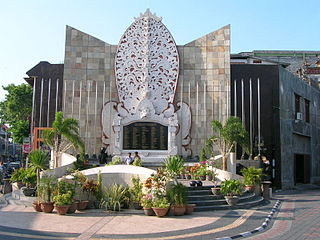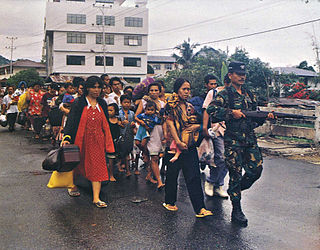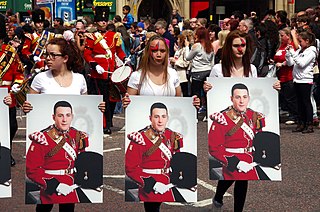Related Research Articles

Central Sulawesi is a province of Indonesia located at the centre of the island of Sulawesi. The administrative capital and largest city is located in Palu. The province borders the provinces of Gorontalo to the east, Southeast Sulawesi, South Sulawesi, and West Sulawesi to the south, and sharing maritime borders with East Kalimantan to the west, North Maluku to the east, and Malaysia and the Philippines to the north.

Poso is the administrative capital of Poso Regency, Indonesia. It is the main port and transportation hub for the central-southern coast of Central Sulawesi. Its urban area consists of three districts, Poso Kota, North Poso Kota, and South Poso Kota. Poso lies in the middle of the province on the shore of the Gulf of Tomini, right in the central part of Sulawesi Island. With a total population of 47,477 in 2020, it is one of the biggest and oldest towns in the province.
The Central Sulawesi Christian Church is the largest Christian church in Central Sulawesi, Indonesia. It belongs to the Reformed family of churches. The church was established in the early 1893 through the mission work of the Dutch Reformed Church and became an independent denomination in 1947 when Indonesia declared its independence from the Netherlands and ordered all Dutch nationals to go home. November 1993, there was in Tentena a celebration feast for 100 years Christianity.
A market was bombed on 31 December 2005, in Palu, Central Sulawesi, Indonesia. An improvised explosive device, described as a nail bomb or similar, detonated around 7:00 a.m. within a Palu butcher's market mostly frequented by Christians shopping for New Year's Eve celebrations, killing eight people and wounding a further 53.
Mujahedeen KOMPAK or KOMPAC is a Darul Islam organisation based in Indonesia's Sulawesi island. Formed in 1988 with the stated aim of helping victims of conflict and disaster, it has been linked to providing funding for terrorist organisations such as Jemaah Islamiyah as well as carrying out attacks on local Christian groups. The organisation has been accused of diverting relief funds from mainstream Muslims in Australia and abroad to fund terrorist activities.

Terrorism in Indonesia refer to acts of terrorism that take place within Indonesia or attacks on Indonesian people or interests abroad. These acts of terrorism often target the government of Indonesia or foreigners in Indonesia, most notably Western visitors, especially those from the United States and Australia.

Christianity is Indonesia's second-largest religion, after Islam. Indonesia also has the second-largest Christian population in Southeast Asia after the Philippines, the largest Protestant population in Southeast Asia, and the third-largest Christian population in Asia after the Philippines and China. Indonesia also has the second-largest Christian population in the Muslim world, after Nigeria, followed by Egypt. Indonesia's 29.4 million Christians constituted 10.47% of the country's population in 2023, with 7.41% Protestant and 3.06% Catholic. Some provinces in Indonesia are majority Christian. In Indonesia, the word Kristen refers to Protestantism, while Catholicism is referred to as Katolik. In the 21st century the rate of growth and spread of Christianity has increased, especially among the Chinese minority.

The Maluku sectarian conflict was a period of ethno-political conflict along religious lines that occurred in the Maluku Islands in Indonesia, with particularly serious disturbances on the islands of Ambon and Halmahera. The duration of the conflict is generally dated from the start of the Reformasi era in early 1999 to the signing of the Malino II Accord on 13 February 2002.
A market in the center of Tentena, Central Sulawesi, Indonesia was bombed on 28 May 2005. Two improvised explosive devices, set to explode 15 minutes apart, detonated during the morning, killing 22 and wounding at least 40 more. The fatalities included a Christian clergyman and a 3-year-old boy. Several Islamic militants were later charged and sentenced to jail terms in 2007 and 2010 for their roles in organizing the bombing, among other sectarian attacks in the Poso region.
The Walisongo school massacre is the name given to a series of terrorists attacks by Christian militants on May 28, 2000, upon several predominantly Muslim villages around Poso town, Central Sulawesi, Indonesia as part of a broader sectarian conflict in the Poso region. Officially, the total number killed in the attacks is 367 but there is no definite figure of how many died. The number of deaths is believed to be more than the 39 calculated from bodies later discovered in three mass graves, and equal to or below the 191 quoted by Muslim sources.
The 2004 Poso bus bombing was a terrorist attack that occurred in Central Sulawesi, Indonesia, on 13 November 2004. It targeted a bus travelling to the majority Christian village of Silancak. The bomb, an improvised explosive device, exploded at 9:15 a.m. (UTC+7), while the minibus was stopped at a market in Poso. Six people were killed and three injured in the blast. Witnesses later reported that three people were involved in the attack. Two suspects were detained, but later released.

On the afternoon of 22 May 2013, a British Army soldier, Fusilier Lee Rigby of the Royal Regiment of Fusiliers, was attacked and killed by Islamist terrorists Michael Adebolajo and Michael Adebowale near the Royal Artillery Barracks in Woolwich, southeast London.
The 2013 Myanmar anti-Muslim riots were a series of conflicts in various cities throughout central and eastern Myanmar (Burma).
A series of terrorist attacks targeting public transport occurred in Poso, Central Sulawesi, Indonesia, between 5 June and 8 August 2002. In total 7 people were killed and 26 wounded, including an Italian tourist. The first attack occurred on 5 June 2002, when a bomb detonated in an Antariksa-owned public bus servicing the Palu, Poso and Tentena routes. Four passengers were killed instantly and 17 more were wounded, one of who would succumb to his injuries two weeks later. On 13 July 2002 the second attack occurred on the trans-Sulawesi highway when the bus driver found a bag lying on the road and asked his conductor to retrieve it, triggering the device: an 18-year-old bystander was killed and at least 4 others severely wounded in the blast. In the third attack, on 8 August 2002, an Italian tourist was killed and at least 4 Indonesians injured when unknown assailants fired automatic weapons into another bus.
"The Beatles" was the nickname for an Islamic State terrorist group composed of four British militants. The group was named by their hostages after the English rock group The Beatles, who referred to the members as "John", "Paul", "George", and "Ringo".

Santoso, known as Abu Wardah, was an Indonesian Islamic militant and the leader of East Indonesia Mujahideen (MIT). He pledged allegiance to ISIL in July 2014. He was killed on 18 July 2016 by the Indonesian Army after two years of hiding in the jungles near Poso, Sulawesi.

The East Indonesia Mujahideen was an Islamist militant group operating out of Poso, Central Sulawesi, Indonesia. The group was led by Abu Wardah until he was killed by Indonesian police on 18 July 2016. After the death of Santoso, the group was led by Ali Kalora until he was killed on 18 September 2021. The group has pledged allegiance to the Islamic State.

The Poso riots, also known as Poso communal conflict, is a name given to a series of riots that occurred in Poso, Central Sulawesi, Indonesia. This incident involved a group of Muslims and Christians in the region and was divided into three stages. The first Poso riot took place from 25 to 29 December 1998, continued from 17 to 21 April 2000, and finally from 16 May to 15 June 2000.
References
- 1 2 3 4 "Indonesians jailed for beheadings". BBC News. 21 March 2007. Retrieved 13 October 2012.
- 1 2 3 "Indonesia flashpoints: Sulawesi". BBC News. 28 June 2004. Retrieved 13 October 2012.
- ↑ McDougall, Dan (20 November 2005). "Machete killings fuel Indonesia's religious hatred". The Guardian. Retrieved 13 October 2012.
- ↑ "Blasts strike Indonesian market". BBC News. 28 May 2005. Retrieved 13 October 2012.
- ↑ "asianews.it". Archived from the original on January 12, 2008.
- ↑ "Three Schoolgirls Beheaded in Indonesia". FOX News. 29 October 2005. Retrieved 13 October 2012.
- ↑ Fitzpatrick, Stephen (9 November 2006). "Beheaded girls were Ramadan 'trophies'". The Australian. Retrieved 13 October 2012.
- 1 2 "Indonesia beheadings trial opens". BBC News. 8 November 2006. Retrieved 13 October 2012.
- ↑ "Muslim Militants Confess To Beheading Christian Schoolgirls". OpinionBug.com. 15 May 2006. Archived from the original on 2012-11-12. Retrieved 13 October 2012. (Warning! Graphic Images)
- ↑ "Prison demand for Poso suspects". BBC News. 21 February 2007. Retrieved 13 October 2012.
- ↑ "Islamic Militants in Indonesia Jailed for Beheading Christian Girls". Voice of America. 1 November 2009. Retrieved 13 October 2012.